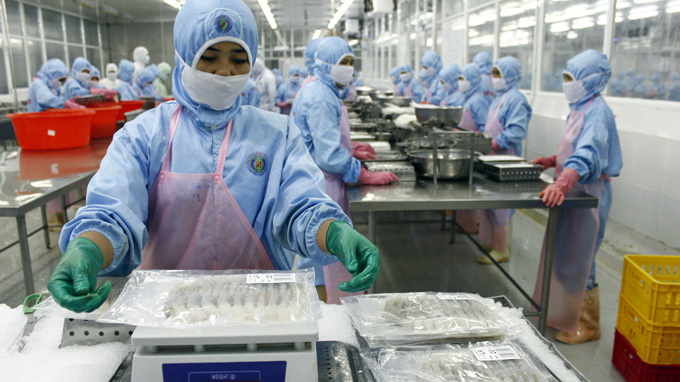While the Government has stated that the local economy has started to flourish with more positive signals recorded over the course of January- November 2013, the World Bank (WB) and International Monetary Fund (IMF) offer a less optimistic forecasts on economic growth for the coming year.
The government’s opinion was given after a regular meeting on socioeconomic assessment concluded earlier this week, while that of the WB and IMF was released on the same date and one day later, respectively.
“The Prime Minister and the Cabinet members agreed on the assessment that the economy has begun to flourish after looking at the overall picture of the economy,” said Nguyen Van Nen, newly appointed Minister - Chairman of the Government Office. “There are so many signs given the latest report by the Ministry of Planning and Investment in November on the socioeconomic situation in the first 11 months of this year,” he said.
“As reported by the ministry, the macroeconomic picture continued to stabilize and inflation was under control as the consumer price index (CPI) rose 0.34% in November and 5.5% from January to November, the lowest level in 10 years.”
“As a result, the 2013 CPI forecast will likely be lower than the 6.81% rate in 2012.”
“In the financial sector, depositing interest rates reduced by 2-3%, while lending rates fell by 3-5% per year compared with those earlier in the year, remaining stable in recent months.”
“In particular, a number of businesses with a healthy financial situation have been borrowing at a rate of 6.5-7 % per year.” “As of November 20, a total outstanding loan was estimated to rise 7.21% against December 2012, doubling the 3.5% rate recorded during the same period in 2012. The liquidity of local credit institutions has also vastly improved.”
“Notably, business development situations continue to improve. The number of new businesses established was estimated to increase 9.5% year on year. Around 12,700 enterprises have been active again, and the number is on a rise.”
However, according to the government spokesman, in some aspects, the situation remains difficult given the possibility of inflation caused by rising demand during the coming Lunar New Year holiday. Also, the bad debt handling process has not gone as well as planned.
In addition, total outstanding loan growth remains slow, especially for production activities. The number of businesses shutting down increased by 8.4% compared to the same period last year, while the total of registered capital of newly established enterprises fell 15.4%.
Uncertain future picture
In discussions with the Government of Vietnam during the ongoing Vietnam Development Partnership Forum 2013 (VDPF), the International Monetary Fund (IMF) expressed their appreciation for the efforts of the Government of Vietnam to maintain macro-economic stability and control inflation.
However, according to the organization, there are still many exisiting shortcomings that the Vietnam economy should overcome.
Among them is slowing growth; real GDP growth has slowed from 2012 to 2013 and seems to be stable in the range of 5 to 5.5%.
Slow growth caused a large budget deficit, which is another issue. In 2010 - 2011, the average budget deficit was 2% of GDP, but the rate rose to 4.75% of GDP in 2012.
"Vietnam has little space for policy maneuverability to deal with external shocks. Therefore, Vietnam should spare its efforts on building up backup sources in and outside the country, " said IMF. stressed.
The World Bank (WB) also has the same view in its latest reoport regarding Vietnam’s economic situation.
Risks for Vietnam's banking sector have continued to be mentioned in the latest report on Vietnam’s economic situation and prospect released by the WB in Hanoi on Monday.
“In the context that local businesses are struggling to survive and the real estate market is bleak, the balance sheets of many local banks continued to be a worrisome issues with much attention paid to loan classification which does not keep pace with international standards.”
“As a result, it is hard to determine the current number of bad debts in reality.”
"If the international standards are applied, the real bad debt number may be higher," said Sandeep Mahajan, chief Economist for the World Bank in a press conference in Hanoi.
In addition to the uncertainty of the banking sector, the reform of State-owned enterprises is also slow, partially causing economic stagnation in Vietnam.
Moreover, the fact that private sector confidence is declining and the fiscal policy is narrowing also causes negative impacts on the economy.
Private investment has plummeted from 15% of GDP in 2007-2010 to 11.5% of GDP in 2013, while the increase in spending by households fell from 8.9% to 5 % for the 2009-2012 period.
Meanwhile, government debt has risen to over 50% of GDP, so the budget overspending, which has recently been approved by the National Assemby to rise by 0.5% to 5.3% of GDP, can only last for the next 1-2 years.
Mr. Mahajan said the lower growth trend will continue in the future. In the 2006 - 2010 period, Vietnam's growth was at 7% a year on average, but in the last 3 years, the growth rate was only 5.6% , the lowest in 13 years.
“This is a significant concern since other Asian countries kept their growth momentum during the time Vietnam faced deceleration," he said.

















































